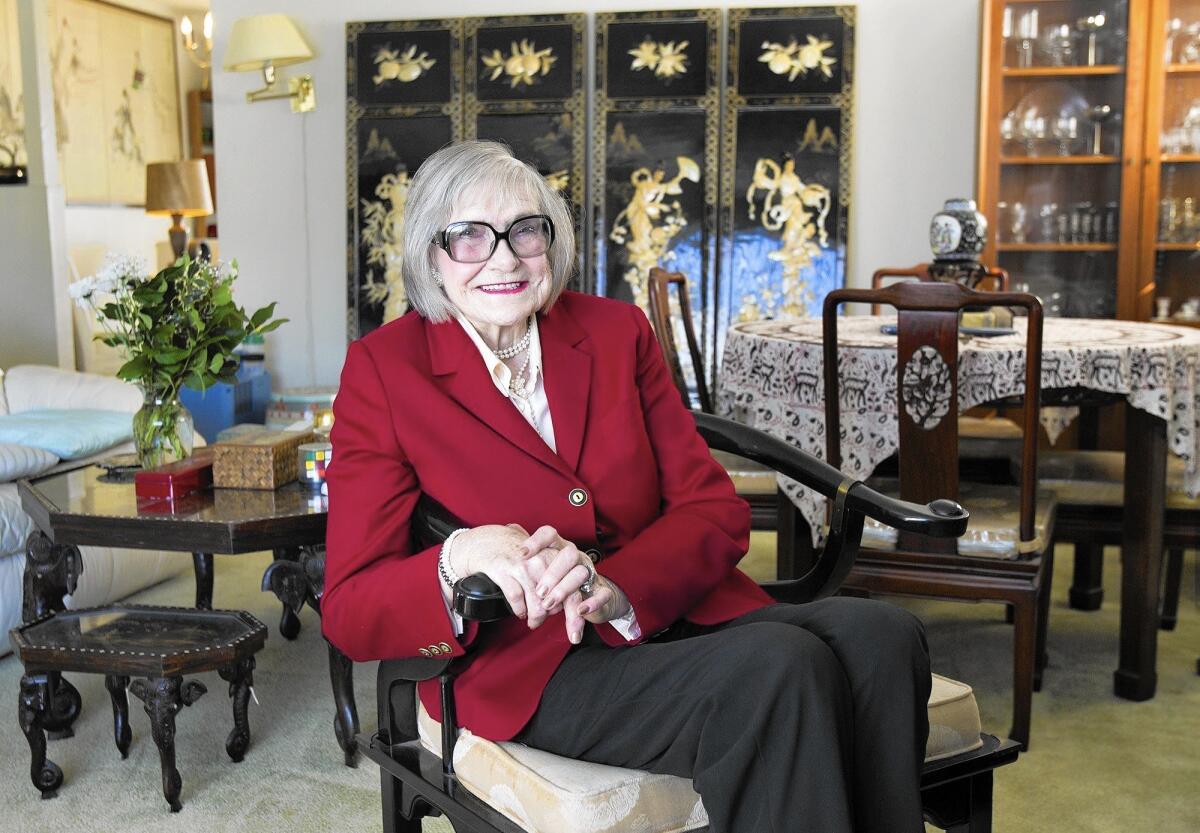One-time burlesque dancer isn’t done yet

Decades ago, Ricki Covette graced the world’s stages with a legendary stature that brought in crowds — of men, particularly — for weeks on end.
With legs that propped her up to an impressive 6 feet, 8 inches, promotional materials of the 1950s, ‘60s and ‘70s billed her as the world’s tallest burlesque headliner.
Come see the “Amazon” woman, the “Glamazon,” the “tallest exotic,” the “girl of tomorrow today,” they proclaimed.
“There’s no body like hers!” still others shouted off the page next to suggestive pictures of the blonde-haired, blue-eyed dancer showing off long legs and plenty of skin.
She appeared in movies, television and theater. Her 82-week run in a famed New Orleans nightclub was a mere blip in an entertainment career that spanned some 30 years.
These days, though, Ricki Covette is taking things slow, and she isn’t called by her stage name anymore.
For the last 22 years, Irene Jewell, 89, has lived quietly in Costa Mesa’s Eastside. She goes to the senior center. She hasn’t headlined the world’s stages in quite some time.
Back surgeries and the effects of old age have left her at around 6 foot 2, still taller than most.
When reminiscing about her past, she often closes her eyes while speaking, as if visualizing the moments, like when she appeared alongside Hollywood stars like Joan Fontaine and met icons like John Wayne.
Interest in the legend of Ricki Covette has never quite died. It lives on with a niche resurgence in burlesque documentaries and on fan websites like Vintage Sleaze and the Burlesque Babes Blog.
She is also occasionally recognized. More than a year ago, when Jewell was being transported in an ambulance after breaking her hip, the driver commented they were “picking up a celebrity.” She didn’t realize the driver was talking about her.
“I didn’t think anybody knew, but someone knew anyway,” Jewell said. “I thought I was undercover, incognito. Back then, burlesque didn’t have that great of a name. Now all of a sudden, it’s shot way up to where it means something.”
Recently, curiosity in her career has reached prestigious new heights: the Smithsonian Institution.
A fan with connections to the Washington, D.C., museum got the ball rolling, and in October, Jewell donated six of her personal albums to the Smithsonian’s National Museum of American History. They contain pictures, leaflets, promotional materials, news clippings and other items that could some day be assembled in a burlesque exhibit.
For an unusually tall girl who grew up on a homestead in Canada, north of Edmonton — “Where it would only get a mere 60 below zero” — the upward trajectory of her career can be hard to grasp, particularly considering that burlesque in her day was frowned upon as risqué.
“I will live forever and ever and ever,” Jewell said with smile. “It’s what they told me at the Smithsonian.”
Jewell was born Irene Siewert in 1925. Her parents were tall — her father was 6 foot 2, her mother 5 foot 7 — but she easily surpassed them. She continued growing into her 20s.
She had ambitions of being a singer and dancer, though didn’t seem to possess natural talent for either. She knew she had to leave rural Canada.
“Where can you get a ballet education in northern Canada, in a homestead?” Jewell said.
Throughout her career, she faced her fair share of praise and skepticism. Her head-turning height brought with it both fame and disdain.
She withstood all the names: Bean pole. String bean. High shorty. “A gal patrons will look up to.”
“How’s the weather up there?” they’d ask.
They called her too tall, “too everything.” She had a difficult time finding clothes and shoes.
One time, Ohio police were even skeptical that Ricki was a woman.
“Oh, she’s not a girl,” the police scoffed. She had to “expose herself” to prove otherwise.
Their reservation, Jewell recalled, came around the time that people were seeing headlines about Christine Jorgensen, a transgender American who underwent a sex change operation from male to female.
Still, Jewell said, she persevered, despite “jealous broads” and their accusations that she danced “like an old cow.” Some didn’t like walking down the street with her. She aroused too much attention.
“They never, ever complimented me,” Jewell said, “and I kept thinking, ‘I’ve got to work harder, I’ve got to work harder.’”
She later realized that she earned more than they did.
But what Jewell lacked in natural gifts and grace, she says she made up for in hard work, training and professionalism. She never took time off “to play.” Nor did she become a pushy, high-maintenance diva.
“I was always on time for the show,” Jewell said. “Never missed a train or a plane or method of transportation, regardless of the weather.”
When she did leave show business, she transitioned into real estate and found success there.
“My work ethic followed me,” Jewell said.
Her stage life far behind her, Jewell now spends her time managing the legacy of her late partner, noted nature photographer Stuart Jewell, who died in 1997 at age 84. The two never married, but she legally changed her last name to his.
News obituaries celebrated Stuart Jewell’s cinematography work on “The Living Desert” documentary, which won an Oscar in 1953. Jewell, who loves to talk about her travels with Stuart, says some of his old footage of the world’s wonders may find favor again.
Jewell says that even though she isn’t as physically nimble as she once was, her mind is still running at “a hundred miles a minute.”
She wants to write a book about her life in burlesque and maybe find some of that spotlight again in talk shows or on the lecture circuit while promoting it.
Jewell isn’t afraid to that next step. “No” has “never been in my vocabulary,” she said.
